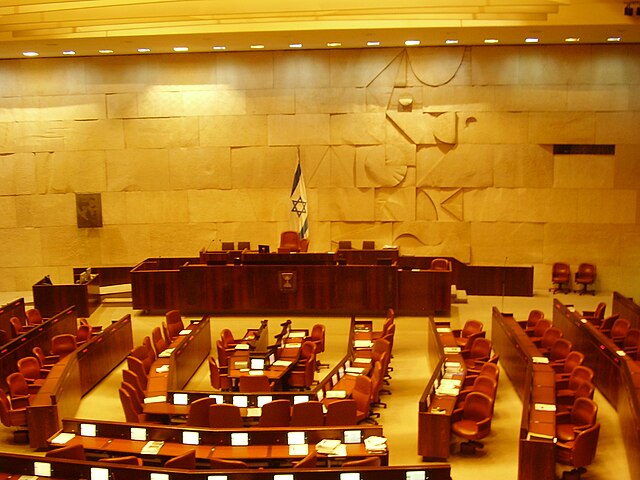INSIGHTS
Rebuilding Israeli Democracy
By Margo Hughes-Robinson
On November 21st, the International Criminal Court announced that it was issuing warrants of arrest for Prime Minister Netanyahu and former Defense Minister Gallant alongside a warrant for (the reportedly late) Hamas leader Mohammed Deif. The basis of the Netanyahu/Gallant warrants was highly specific, focused on the Israeli leaders’ alleged limiting of humanitarian aid and basic supplies like water and electricity from reaching Gazan civilians during the war. The resultant humanitarian crisis in Gaza has led to ever-increasing civilian deaths, not only as a result of military violence, but also due to the near-famine that has plagued the entire area for nearly a year.
The horrific ongoing conditions in Gaza are likely to only worsen now that Israel has banned UNRWA from operating in Gaza, the West Bank, and East Jerusalem. While the organization has long been deeply controversial in Israeli society – and we are heartened to see the thoughtful recommendations from the United Nations’ recent independent investigation of the agency – there is simply no practical replacement at present for its established and reliable infrastructure for distributing humanitarian aid.
As we continue to seek a future for Israelis and Palestinians based on human rights and equity, I meet this inflection point with grave concern. The involvement of the international community in this issue is reflective of the deep breakdowns in democratic norms in Israel, where the internal system of checks on executive power is being overridden: Reports released last month, for example, confirm that Netanyahu is seeking to prevent the establishment of an independent state commission of inquiry into the events of October 7th, and thus prevent any accountability to the Israeli people, who overwhelmingly support an end to this war.
Had Israel taken the advice of its Attorney General, Gali Baharav-Miara (who Netanyahu has made it clear he wishes to fire), a few months ago, regarding beginning a formal investigation into the events of Oct. 7 and their aftermath, it would likely not be at this juncture. The ICC takes over if there is no reputable national investigation mechanism. Israel has such a mechanism – and it has worked well in the past. However, with the Prime Minister moving heaven and earth to prevent an investigation, the ICC is now involved. The arrest warrants are a stain on Israel that will remain for years, whether or not they are ever served.
Within Israel, pathways back to a functional internal democracy remain, but will require drastic steps. Many experts on healthy democracy indicate a number of factors and national institutions that reflect a thriving government responsive to the needs of its citizens, among them a functioning rule of law, civil rights protections, free and fair elections, responsive governing bodies, robust civil society organizations and civic participation, as well as free press and media. A number of these appear to be crumbling in the wake of Netanyahu’s past several years in power, even prior to October 7th. The attempted (and ongoing) judicial coup and prolonged weakening of the Israeli justice system, the attacks on foreign news organizations and Israeli liberal media outlets, and the decade-plus erosion of support for liberal NGOs leaves many of these national indicators in grave peril. For example, the new official suspension of due process for Israeli citizens of all ethnic backgrounds under the guise of “addressing organized crime.” This is a real issue, but one that many Palestinian citizens of Israel feel that National Security Minister Itamar Ben-Gvir has actually purposely ignored or underprosecuted, putting their communities further at risk – and something that this new legislation does not actually address.
In the short term, there are immediate steps that can be taken towards restoring Israeli democracy. Some of these are bureaucratic: an actual appointment to the role of Supreme Court president, a post that the Likudnik Justice Minister Yariv Levin has neglected to fill for a historic number of months; not just allowing, but supporting internal probes into war crimes in Gaza as well as a state commission of inquiry into the Israeli government’s failures on and around October 7th; an end to the war with Hamas, accomplished through a bilateral ceasefire and a comprehensive hostage return deal. There are, in fact, a number of Israeli politicians calling for these steps, including seeking to directly prevent the increase in police violence that Israelis citizens protesting for change have been met with on the streets of Tel Aviv, Jerusalem, and elsewhere.
But beyond these, a more fundamental reconsideration is required. As Hadash MK Aida Touma-Souleiman remarked recently in the Knesset, it is impossible to keep one’s eyes only on the day-to-day bureaucratic issues of functioning within Israel’s national bodies while children are dying every day in Gaza. An effective democracy in Israel cannot coexist alongside the ongoing occupation of the West Bank, the administration for which has been from a military command to a civil Israeli body under Betzalel Smotrich, who also loudly and frequently announces his plans for annexation. Nor can it exist alongside the current war and seventeen year blockade of Gaza, or in a country where the Nation-State Law remains on the books and in practice, now supplemented by what legal watchdogs have pointed to as increasing legalized segregation under July 2023’s expansion of the Admission Committees Law, already used in the Negev to create new Jewish-only towns overtop the ruins of destroyed Bedouin villages. In the long-term, a secure and functional Israeli democracy will also require a healthy and democratic Palestinian state.
In this moment of great political darkness, it remains the role of Partners and so many of our associated organizations to continue to provide American support and connection to the voices within Israel’s government, in grassroots movements, and in the streets who are building the collective political energy to make these necessary changes. And we cannot abandon their vision, even when the challenges are this dire. The path forward towards a multiethnic, enfranchised democracy is possible, but it will require a frank reckoning with the facts on the ground, not the facts as we wish them to be.

Rabbi Margo Hughes-Robinson is the Executive Director of Partners for Progressive Israel.






Leave A Comment